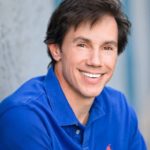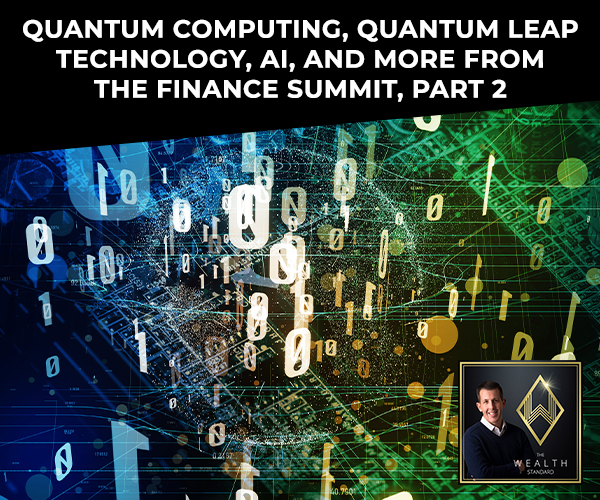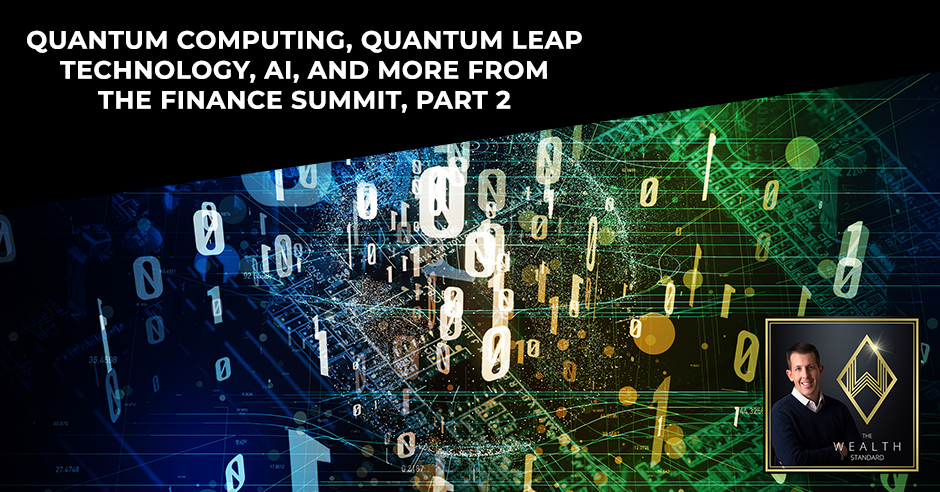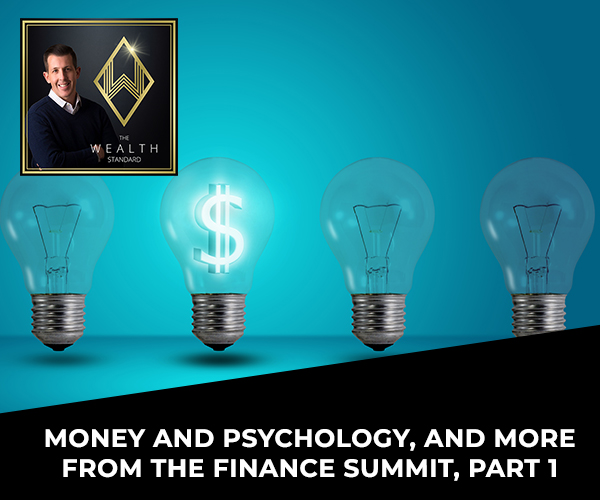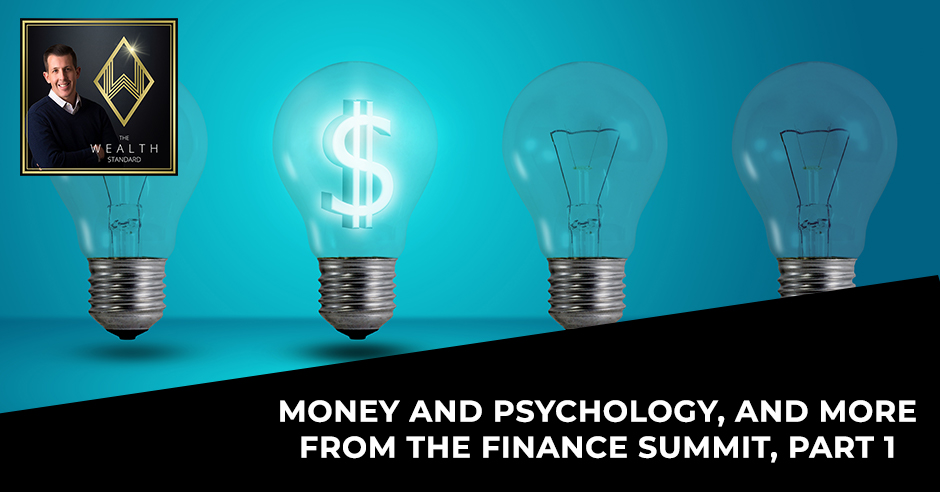Training The Next Generation With Aaron Chapman
Podcast: Play in new window | Download
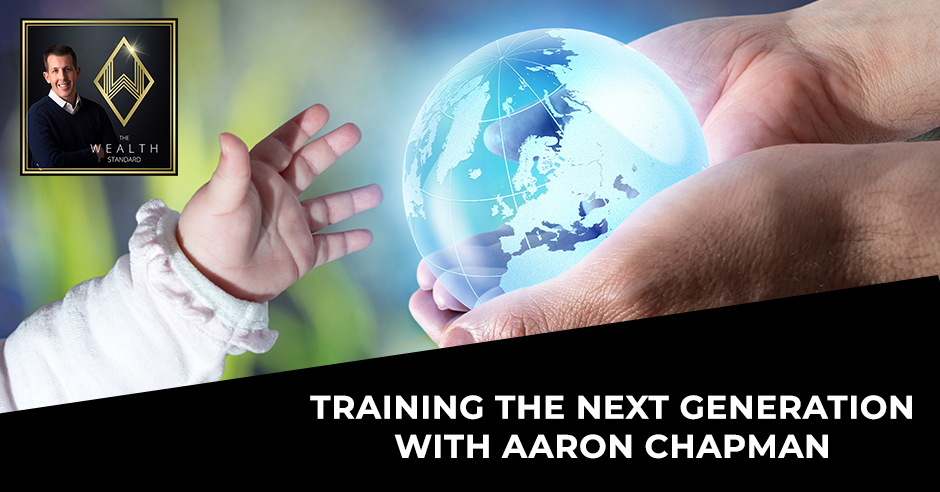
Humans are creatures of habit, which is why from an early age, people need to be educated about which habits are good and which are potentially destructive. Training the next generation is really the best way to ensure that these habits, values, and motivations are instilled from an early age and not so easily discarded once they go into working environments. Aaron Chapman is a veteran of the finance industry working at SecurityNational Mortgage Company. Aaron speaks to Patrick Donohoe about when to instill these habits and the best ways to keep them ingrained. Is it time for you to learn some new habits?
—
Watch the episode here:
Listen to the podcast here:
Training The Next Generation With Aaron Chapman
We’re going to dive deeper into residential real estate investing. My guest has been in the industry for quite a long time and has a different angle. We took the conversation in a direction that you will be definitely inspired by. My guest is Aaron Chapman. It was an in-person interview. The last couple had been in-person video type of interviews. Make sure you head over to our YouTube channel because those interviews and the video are housed there. Aaron Chapman is a veteran in the finance industry. He started in 1997. Since entering the finance industry, his clientele has ranged from purchasing their first home, building their dream home or investing in multiple properties for long-term cashflow. He considers his expertise complicated. He’s presently ranked in the top 10% of the 300 licensed loan originators in the United States, which is a huge feat. Aaron and his wife also take huge pride in a family business structure that they have developed. They openly discuss their assets, their reason for being, and their mission. They have created a system of accountability with their kids, which is unprecedented.
You will learn about that in the interview. The kids are very much engaged and also are able to participate. Aaron and his wife also retired from nine years of service with the Pinal County Sheriff’s Office Volunteer Rescue Unit. They both retired as team leaders. During that stint, they experience an excess of 50 rescues per year. In many cases, the missions received international media and local attention because they were able to preserve lives in extreme circumstances. This guy is amazing. You are going to be inspired by how he thinks and what he is motivated by. I can’t wait for you to meet him. Without further delay, please welcome my guest and my friend, Aaron Chapman.
—
Thank you for tuning into this episode. It’s going to be an awesome interview. You don’t know it yet, but you will soon know. Aaron, it is awesome to have you.
I was impressed with what I saw because we walked up to this place and like, “Are we going to that building?” We get in and it’s like, “This place is awesome.” You let me in, which is a good thing. People let me come in, hang out, meet your staff and see everybody here. You’ve got a cool operation. It’s a cool looking place.
I also tell you about my first impression of this building when we first moved in. There used to be a Mexican restaurant and a nightclub. I didn’t know. We came in on a Saturday night over the holidays. They had this runway out on the patio. There were girls in Santa Claus attire. That was my first impression of the building where the whole building was shaking and that was going on downstairs. My wife was with me too. That was a good experience.
Aaron, it’s serendipity because we’re focusing on investment, but a lot of the interviews have gravitated toward legacy, meaning and purpose. In the end, a lot of people are in this rat race in a sense of what they’re doing financially and don’t necessarily know what the end result is. They think it’s retirement. Other than that, most people don’t dig deep. You were going to be in town because the main company that you do business with is located in Salt Lake. It worked out that you’re going to be here. You’re going to be able to meet the entire team, come to the office, but also do this interview.
You’ve been writing a mini-book that is very inspiring. It revolves around legacy, purpose and meaning. I’m excited to interview you because all these events had to happen in order for you to be here. There’s definitely a design behind it. You’ve supported our business as an advocate working with Gary Pinkerton and I’ve learned a lot about you. You’ve spoken on the Cashflow Wealth Summit a couple of times. You’re a stand-up guy. You’re a man of principle and purpose. It’s awesome to know you.
Thank you. I appreciate that. The reasons that I can do those things is because of the stand-up people here at Paradigm, the stand-up person that Gary and you are, the principles and purpose that you operate your business with and your lives. I can walk beside those kinds of people. It’s difficult to live a life and you’re seeking purpose and significance, but the people around you are not or what they’re seeking is the wrong things. You can’t couple those things together. You can’t walk together. The reason it’s easy to be able to do what I do as far as supporting this organization and be able to point people to the knowledge that you guys exist is because of who you are.
Let’s dive into something I’ve done with all of the guests, which is be able to gain quickly their perspective of life, business and investment. It’s with a couple of rapid-fire questions. Pre-work, who was a role model to you, someone that you looked up to or inspired you?
It might sound cliche but it’s my parents. I always sought their acceptance of what it is that I did. They were very hardworking people. They would be all night long going. I say this about my mom, if she sleeps, she’s hanging upside down. That woman goes and goes. Even now at 72 years old, she’s still going. I grew up watching them work their guts out. We did some time in my high school years on the cattle ranch. We had a partnership with a cattle ranch. My dad and I were out there together a lot. We worked together in the mines in New Mexico before I came into this. One of the big things for me when I was working with them in the mines was to be able to experience that, and then for him to call me his partner underground to the general manager. I knew I’d made it to the goal where I wanted to be. Through my childhood, when he was mining and not when we were cattle ranching, because we were mining a lot of other times, we were referred to as a partner. That was a big deal to me who that person was. For me to be claimed that was a big thing for me. Working with my mother, she was in real estate, I was doing regular type of lending for home buyers. We worked together a lot. Having her willing to continue to offer my name to her clients because she won’t do that if you suck. If you don’t do your job, she has zero patience for you.

Training The Next Generation: A legacy is educating people enough to know where their end is and what tools they can use to achieve that end.
The nepotism idea is even more so.
It’s a reverse nepotism. She works her guts out. I didn’t. I had to continue to earn that position. That would be the people that I needed to work to continue to get that type of acknowledgment.
Second question, what superhero or icon in history did you most resonate with?
I’ve got to say the Hulk in a way because you could be a very calculated and thoughtful individual. He was a scientist and very brilliant mind in there, but then life happens. My business has been in one of the situations where no matter how hard I try and how much I did to go about a calculator process, there’s always somebody there to block you. There’s always something to hit you. There’s always something to try and knock you down. I found that I had this power internal part go back at it like a silver back on Coke and go after what I wanted because I knew it was right. I knew it was necessary to overcome those obstacles and be able to see what was on the other side.
It wasn’t where I went out in a crazy way like you have no control, but I can see how you finally have that internal fire that comes out. You are able to push through that obstacle. They’re not even obstacles anymore. What used to be like a huge difficulty I overcome because we have such momentum with me and my team that I don’t even feel those things. It feels like a little bump. It’s like a train of full board. When you need to go out there, it’s readily available to me. When you look at an actual historical icon, we’re sitting in Utah and you’ve got Porter Rockwell.
I remember reading books about him. He’s an individual who was a kind man. When the time came and when he needed to, there was no line even for a personal cross. He took care of business in a big way and I identified with the way he went about life. He did the right things. When things are off a little bit, he went at his way. That might even be a reason why I look the way that I do. I’m going about things my way. Even though I’m amongst groups, either it be religious or business, this is the individual you’re dealing with. I don’t give a crap what room I’m walking.
Carl Jung, the difference he’s made in psychology is identifying those four dominant archetypes: the warrior, the magician, the lover and the sovereign or the king/queen. From what I’ve studied, the ability to associate those archetypes of your personality at the right time equals an incredibly meaningful life because you’re not showing up as one all the time. You identify who those archetypes inside of your personality so that when you do show up, you make the biggest difference. Imagine showing up to a hard situation that requires a warrior, but you’re the lover. It doesn’t work so well. You may dent a few legs but you’re not going to get anywhere. What charitable causes do you support?
You mentioned the book and I have released four. We may even talk about those, but those four are out. We have yet to get the marketing behind them. Every penny that comes in through those books is going to go towards charities here. I’m working on supporting veterans housing, The Land Foundation who handles cerebral palsy, trying to get research done for children. There’s Operation Underground Railroad and we know what they do and what is necessary. That whole subject to me is something that turns my gut, but inspires me to think on ways to try and help.
Every cent is going to go to help those causes. That’s why we even have some of the systems we have built in place to help those who can’t help themselves, but we’ve screwed it up. This is the one thing that I get to control. I’m going to control the sales of those four books to go to those causes. I’m telling anybody who’s reading, I spent in excess of $20,000 to get those out. I’m asking you to spend $30 to $35 to support those foundations. I’ll support them with $20,000 plus. Please support it with your $35 to $40 to pick those up and work with me to get some resources into the right hands.
Finally, legacy, if there was one attribute that you could impress upon your kids, grandkids, the world, this audience, what would it be?
It would be to be able to direct your mind. That’s the one thing that I want everybody to be able to gather control over. You’re probably like me, I’m a big fan of Napoleon Hill and his book that was released in 2011, Outwitting The Devil talks about a person’s ability to control their thoughts and focus them where you have the most success. 98% of the people drift. They focused on nothing and accomplished nothing. People ask me about my business and why I focus almost solely on real estate investors, doing financing for real estate investors, buying those single-family duplex, triplex, fourplex homes. Why do I not target realtors? Why don’t I go after first time home buyers? I found when you tried to be everything to everyone, you’re nothing to no one. I focused and went after one specific type of client. I went from doing 100 transactions a year to 723. I’ve been consistently 700 for three years. One thing I will preach to everyone, if you can control your mind, control where you’re focusing your energy and not yanked at 100 different directions, you will be able to find the success you’re looking for.
New technologies continually make it easier to educate the next generation. Click To TweetI’m curious about what’s driving you because you’re an incredibly driven individual. The first question I had is how do you characterize legacy? You give me a preview of what your next book is going to look like when it comes to the legacy you want to leave for the world, for your family specifically. How do you characterize what legacy is?
People being able to pick up the pieces that are left when you exit and be able to continue on the exact same path. Not necessarily does it have to be 100% of the end result that you planned for, but the result that they planned for. For me is to educate my children enough about what I have done, what I’m intending to do and to understand and figure out what their intentions are. When I do leave this sphere and they have to pick up the ball from there, from what I leave, they can use that to continue to grow towards their end goal. A legacy is in reality educating people enough to know where their end is and knowing the tools that they’re left and how to use them to get to that end.
You alluded to something in the beginning, which is what I’ve found with most of the guests were their biggest influence was their parents. A lot of that development happens within the first ten years of life. If you look past to their parents and their parents are going back to generations, it’s amazing to see how one little thing can make a difference for future generations. I look at something that I’ve questioned myself in and often thought about, which is what am I after? What am I trying to achieve? Ultimately, I believed that the meaning that we get comes from us being able to make a difference. It starts in those inner circles and then works its way out. The inner circles are your kids and your spouse, then you go to your extended family, then your community. When you grab hold of what creates meaning for you, life starts to take off. It sounds like that’s been the case for you.
It is in a big way. You talk about inner circles, your inner circle evolves to an outer circle, which becomes your inner circle again. You have your parents and your siblings. Eventually you’re looking to expand that inner circle to an outer circle, which is a spouse. When I met Rizzo, I brought her into an inner circle and then we have kids and that create inner circle. We then have friends and business associates. You and I may have lived and stayed away, but there’s an inner circle forming there. Part of it is I’m looking for the acceptance of my family and continued acceptance of my spouse and acceptance of my kids. I wanted to be able to lay my head on the pillow at night and know that those people that are in that circle that’s ever-expanding have the best thoughts possible with me because of what my intentions are. My intentions are not for me, but my intentions are for them. If we continue on that path, everything we’re talking about achieving on the legacy side is easily achieved.
Talk more about what drove you to write the book that you’re writing around legacy and a system for the family. Where did that idea spark? Maybe it had to germinate along the way, but where did that come from?
I remember back in 2012 when I started typing. I wanted to give something to my kids. I wanted to leave something. They were all very young. It’s amazing what has happened in this window of time. I started hammering away on a tablet I had and I had one of those Samsung Galaxy 10.1 whatever they were. I found myself there all the time starting from childhood. What it boiled down to is I was trying to understand my kids. I don’t remember the circumstances. Something was going on there. I couldn’t get what was going on with them. Why are they not getting it?
I had to take myself backwards to that age. I stopped myself back at those early ages to try and put myself in a position to understand what were they thinking, why were they thinking it, how can I identify with them, and how can I communicate in a way that they would understand? From that initial thought of putting myself in a dormant state to think through that, I started writing. I started creating my entire life story up until 2015. It’s amazing, I got to nearly 400 8.5×11 pages and 9 or 10 is what the size of the script was. It was amazing how much data was there.
I’m like, “I’ve written all this, I need to put them in book form.” Somebody introduced me to an editor who was working for Tony Robbins for a number of years as his personal assistant. I put this in her hands. She read it. She says, “This is all great, but nobody gives a crap. Give them something that they care about first and they’ll care about this.” I’m like, “What do we do?” I paid to have this ghostwriter package done. I flew out to her location in Olympia, Washington. We sat at the Lake House for two days. It started out for the first six hours and it wasn’t working.
The information wasn’t flying, nothing was flying. I was telling them there was something happening here. We had to get into a deep conversation and start uncovering some things, then it started to flow. We spent the rest of that day and into the next day recording conversation after conversation. After a few months, they gave me the finished product. I read it and I’m like, “I can’t publish that. That’s not me.” They’re like, “What do you mean it’s not you? This is all your words.” “That’s my words, but it’s all edited. You took the stories and some of the meanings even change the way that you typed it up. It’s not the same meaning.”
I went back and what they do is awesome. It got me started. I started all over again, but now I had processes that I’ve gone through. I started typing. It hit me one day. I was talking to my brother-in-law. I was in the Admiral’s Club in Dallas. That’s where I got off a plane. He’s calling me and we’re talking. He goes, “I was thinking. You hit on a lot of topics. I hear you talking to different people and doing these podcasts. You need to start touching on specific topics and write on that.” I’m like, “You can’t do that. How am I going to do that? I can’t do a full book on that.” He’s like, “You don’t have to do a full book.”

Training The Next Generation: Today, accountability is not always built into the ways people operate, and kids are influenced by this lax environment.
It started occurring to me. I take all the content of a full book and break it into releasing it chapter by chapter as a small book like the dime novels of the 1800s. I started off with a book called Point Your Head and Heart…Your Ass Will Follow. It’s all about if you think it and you believe it and you write it down, you will show up there and it’s happened repetitively in my life. The second is a book called Gratitude: A Practical Application. It illustrates two separate contrasting events that created my understanding of gratitude as actual economy. This is not some agreement between me and God.
There’s no mystical piñata floating around that’s going to drop gratitude blessings on you because you walk around with gratitude. It is an economy between me and you. It’s very well illustrated between two different people I met in the same week. The second one is called Quit Jerkin Off. You can take that phrase however you want to and figure out your topic, but what it boils down to is habit that people are losing so much productivity to have and it gets back down to controlling your thoughts.
The final of those four is called Stihl Runnin. That’s about one of the icons of my life, my dad. Watching him with that Stihl chainsaw he had. It’s an O41 made in early 1960s in West Germany and how everybody else on the mountain would have problems with their chainsaw, but that kept running and it still does. It’s in my personal collection. It explains where I wear the hat. It’s a lot about controlling your mind. Back to that mental focus situation. We’re then going to go into book five, which is what we’re talking about now. I’m titling that book five, The Business of Family.
What it boils down to is I have been able to create a system within my family, having my kids being held accountable to what they’re putting aside for their future even at a very young age. Nobody ever held me accountable. They said save. That’s all they did. Nobody showed you how. Nobody taught you how. They told you, go and invest into a mutual fund or something. My children and I now on a fairly regular basis, we sit down. We go over the investments we’re going to do. We go over the family holdings. We also go over a log that they are putting aside 10% of their income for their future. They’re getting their own life insurance policy and we’re training them how to use it.
We’ve created an engine to be able to use our income with our life insurance policy to buy real estate investments and rotate it back through this engine of growth. I can illustrate to people how to do that within the book and also with other materials. It’s a matter of seeing the change that happened in my kid’s life. I’ve got to think like there are a lot of people frustrated with the next generation and this generation, but they’re not doing anything about it. I can’t things bitch about what’s going on with the generation and the following if I’m not doing any of these. I need to participate in doing it. The easiest way would be to start is with my own kids. Get them on a track and then after that everybody else. I can’t walk into people’s houses to get your kids over here or I can create some documents that they can use as a framework. I can partner with somebody like Paradigm Life to get that framework out. We can work together on technologies to continue to make it easier and easier to educate the next generation.
If you go to our generation, the generation before us and all the way back, the necessities and the physiological needs of life continue to get easier and cheaper and almost built-in. If you go to a lot of the generations in the past, the accountability of life was built in. If they didn’t prepare or organize, they died. Now, you don’t have to hunt. You don’t have to store food for the winter and ration during the winter. There are many conveniences now that the environment of accountability continues to decline. I look at my kids and even though their life seems easier from that physiological standpoint, it’s much harder because the previous generations had it easy. We had accountability built in. Now accountability is not built in. If you look at where kids are influenced, they’re influenced by their environment. It’s a very laxed environment. They think things happen in certain ways because they haven’t been taught and the older generation assume that they know and they don’t know.
I never even thought about. That is a very good point. If you did not do certain things, the outcome was swift and it was certain. It was right there in front of your face. Now everything has softened. It’s interesting to think that our children can survive easily. One of the things I’ve noticed and people are interesting creatures. They don’t realize that being able to survive is a skill that can easily translate to thrive. You see a guy who’s trying to dodge the tow truck that’s coming to get their car because they aren’t making the payments. It’s amazing how quickly they can come up with money to make those payments when they’re losing their transportation. If they have that type of energy and put that fuel into it to get to that point to pay all that stuff, why do they take the foot off the gas? You know the momentum it took to get there, can stay right there behind. They can take their foot off the gas, but if they keep the foot on to throttle a little bit, you can stay at a cruising altitude.
They wanted to take their foot off the gas and say, “I’ve got three more months before that guy shows up again.” It happens all the time. Many people in my immediate sphere, I’ve seen that happen too over and over again. Why don’t you keep going? What is the allure of your couch or your video games or whatever that is that stops you from having a much more comfortable existence? Nobody says you have to become a millionaire or billionaire or whatever. How about paying your bills?
That’s where I look at the habits that guy had were built in a long time ago. The influence that he had when it came to money, whether it was his parents or his environment, his social circle, his work circle, who knows. Right now, everybody has those habitual behaviors that they operate by. Very seldom it’s consciously controlled. It’s all unconsciously happening. You look at where the most influence happens, especially with kids, is in those early years is the first 10 to 15 years of life where they are impressed based on their environment.
Their environment is controlled usually by the parents. That’s where I look at the influence that I’ve had from my parents and my grandparents to my parents and my great grandparents to my grandparents. All of that has influenced how I show up for my kids. If I want things to change, I wasn’t necessarily happy with certain elements of how I grew up. I believe my parents did an amazing job. If I wanted things different, if I had one of the things even better, that was on me to create the environment in which that was going to happen.
Everyone has habitual behaviors they operate by that are seldom consciously controllable. Click To TweetThe environment is interesting. If it’s not done dynamically, it could have unintended consequences. My wife grew up in the slums of Mexico in a cinderblock home, concrete floors, very humble circumstances. Her dream was to give her kids what she never had. I understand that motivation. At the same time, there are huge unintended consequences from that. It provides this environment where kids aren’t necessarily accountable or learn the principle of self-reliance. If we recognize the elements of what influences people then we can customize it to what values we want to layer on to them so that they have those unconscious behaviors going forward, not the ones where they’re fending for their life when the tow truck comes to take their car.
The tough part is giving all that information, boxing it all up for him, you’re teaching the best you can, but then you have to walk away and let them do it. I’ve also noticed in many families, you could have 4 or 5, 6 kids in the family and 1 or 2 of them do some amazing things. The other ones are completely different and they all grew up in the exact same environment because they accepted things differently. It’s so easy to see the negative, “Mom and dad did this stuff to us, but what about this over here? I never saw that.” “How is it that I saw it?” We were in the same room together. We were there the whole time together. We weren’t even separable, but yet somehow you saw only the negative.” That’s a difficult thing for us to wrap our head around our parents, also educators, business mentors and business people whatsoever and we’re leading our clients to do an end goal, to give them all the data they need and then do nothing with it and be able to accept that and not get frustrated. That’s tough.
Information and resources are more abundant than in any point in time in history. At the same time, the use of that information, the understanding of how to be resourceful and use that for a certain achievable end. That’s definitely lacking.
It made great data cheap as it is. I can get amazing stuff. It doesn’t become valuable until you use it. The second I put it to use, the second I put Napoleon Hill’s works to use, that can be extremely valuable. I heard about his stuff. I had a seventh grade English teacher write his quote, “What the mind of man conceived and believed, he can achieve.” In my yearbook in seventh grade, that still stands out. Your book is long gone but Mrs. Shumway writing that stood out. I’d never ever seen that phrase again until I read Napoleon Hill’s works in 2016. That’s when I first picked up his books in 2016 and I started reading that. It was 2015 or 2016 when I started picking up the book. The change that had happened to me from 2015 until now had more impact in that little time of getting that education and put it to work far greater than that time before as far as my business impact. You look at my last few years, I’m ranking the top twenty people in United States in my business.
There are 300,000 people in my industry. I’m in the top twenty for transactions closed. It all started in 2015. It all starts from educating yourself with the data that’s out there. My job is now to take the data I already know and refine it down into a way that people will hopefully listen. I’m trying to dumb it down a ton. There’s some high-level stuff out. There’s nothing new. I’m giving it from my perspective. I practiced it and used it. I saw the success of it in a very short window. Now I’m handing it off in little bite-sized chunks.
The information existed, you had all these different experiences of time as well as that quote in the yearbook. What brought it together? You read Think and Grow Rich, The Law of Success, and Outwitting the Devil. What was the connection? You were reading it. What did you become aware of that you weren’t aware of previously?
I started a partnership in 2015. You’d call him my competitor. He and I run an event. He started pushing me to come and merge our businesses. We did in 2015. In a need to contribute to the growth, we were on a trajectory. We’re going to accomplish some major things. When I made that happen, I was like, “There’s some huge potential here.” It wasn’t just me. This was somebody over here who I’ve had held in pretty high regard. He was getting it done. He saw enough in me to bring a board with his team. I have to step my game up. I was having some chicken wings with a buddy of mine at one of those little Irish pubs.
He had told me about the book, The Goal by Eliyahu Goldratt. I took that book and I started figuring between that and the system that I was already creating in my head. I called my Chipotle System, which is how we get loans done. It’s like going to Chipotle to get a burrito built. I started taking from The Goal things to be able to implement those manufacturing systems to finance, to building an intricate financial instrument for real estate investment. That’s where it started. It’s trying to contribute more to the whole. That partnership severed. He had decided that he didn’t want to continue and he walked and left me. In November 1st, 2015, I start over with nothing. Starting over with nothing, I had greater knowledge. The knowledge of, “This is possible. We could do this because we were doing it.” I saw that it was working for some reason, he didn’t. What he wasn’t seeing, I can’t speak to, but what I saw was a huge growth in a short window of time.

Training The Next Generation: If we recognize the elements that influence people, we can customize what values we want to layer on to them so that they have those unconscious behaviors going forward.
I implemented those things. I got to thinking at that point, I was like, “If I got all that at one book and all these people kept talking about this Napoleon Hill guy, maybe I should listen.” I cracked open one of his books and it started. I cracked Think and Grow Rich because that’s where you start. A buddy of mine told me about Joe Dispenza’s book, which is Breaking the Habit of Being Yourself. I cracked it open. I tell everybody about Joe Dispenza’s Tacoma TEDx. You’ve got to watch that Tacoma TEDx Talk about how that mind works and connects neurons. I saw those things.
Let me get into the next thing. I got into Outwitting The Devil. Somebody told me about that. I was telling about some of the books I was reading. I share with them Dispenza’s book. They go, “You should check out this book.” They shared with me Outwitting The Devil. I’ve never heard of that. I read that and that was eye-opening. I read it once and listened to it three times on Audible. The Audible version with the contracting voices is amazing. I went from there to The Wisdom of Success. It continued to domino. I start to discover the most influential book on me. It’s Charles Haanel’s book, The Master Key System.
In fact, I shared that you’re going to do this thing. That helped me train my mind properly. I get into scripture. Every morning I started getting up at 4:30. I’m still deep into the Old Testament. I’m reading it along with Skousen’s The Third Thousand Years. I started off with The First 2000 Years and I’m about twenty pages left of The Third Thousand Years and go into the next one. I’m now through the Exodus and all that, which is amazingly deep stuff. When you couple that with Skousen’s work, you can see how to handle people.
There’s a lot in there. Not to take this down a religious path, but when you start looking at the works that we’ve all talked about and you look at the work of the Bible, the book of Mormon and other scripture and all these things together, you start finding that there is no religion. This is the history of us. This is like my dad telling me what I need to do to be successful. This is the Creator of all things saying this is the stuff you’ve got to do to be successful and follow it. When you get it from people’s perspective like Hill, Spencer and Haanel, then you couple that with works that have been in existence forever, it’s all been there. Every single thing has been there.
The values associated with a meaningful life have been there for a long time. The principles that govern behavior have also been there for a long time.
You have stories on how to practically apply it. That’s the difference. We didn’t have practical application.
That’s where as we were talking about kids, practical application for you required signing a partnership. It put you in this position where, “I have to do this.” It’s no longer a choice. It’s, “I must do this.” When your partner left, it created an even more refined environment where it’s like, “I have to do this.” That environment can be controlled and designed intentionally. However, for most people that you have these epiphanies of life, it’s been done because of a car accident or a loved one passing away or having a near death experience, something like that.
I’ve had all those but for some reason, this was the most poignant.
It’s different for everybody where they come to this realization of, “If I don’t do this, the consequences are severe. The consequences are way more painful than the actual pain of changing.” That environment, going back to legacy, I’ve shifted how I influenced my kids. I’m intentional about the environment and intentional about what my motivations are, what my values are and the reason behind, sometimes things being difficult because in that difficulty is where your mind engages all the different resources of your life that you’ve learned, that you’ve read about. It gives you guidance on what action to take, which then refines your habits. That’s what it’s about.
Og Mandino wrote The Greatest Salesman In The World. He puts humans as creatures of habit. We all need to understand it. You’re going to be guided by some form of habit. Form good habits and become their slave. Tactics and strategies will continue to evolve with your environment. It’s the principles that remained the same. If you form the habits around principle and you have the right principles, everything starts to work for itself. People ask me, “How do you have the energies to have all these things done?” It’s because it all goes back to my basic principles. If it fits within that, I move forward. If it does not, I ignore it and move on what does.
What does this have to do with investment? That’s our theme for this. It has a lot to do with it. Most people may think, “You’re talking all this stuff, but what does that have to do with investing?”
The bottom line is the person has to decide that they want to invest. They’ll start building the principles around the investment vehicles that they’re choosing to do. They have to get the principles around what is the bottom line that I’m going to invest into. Too often people are like, “I’m going to run the numbers.” What result do you want on the numbers? Run them all you want, but you can get different results depending on what numbers. There are a lot of people out there that loved to throw out the pro forma. People are like, “Pro forma has to come up with this.” When you look at all the numbers most of us made up anyway.
Professor John Abernathy at the Kennesaw State University tells his students that pro forma is made up. None of it is real. It’s hopeful. Let’s look at real numbers. I take these investors back to the principles of the real end result you’re trying to get and I can show them how the real estate gets there. It’s not all about the loan. The loan in my opinion, that’s a 30-year fixed mortgage that we can get is the greatest asset associated with the transaction. It’s not debt. This is a great asset.
When I back them into how to find that as the asset, because the inflationary environment we live in, the tax environment we live in, the appreciation environment. The appreciation is easing on the radar, the amortization of the loan by your tenant and that cashflow, even if the cashflow is $150 to $200, if you’re buying in a place that will stay reasonably rented, it has the ability to raise rents because of inflation. I can show you how it’s 100% return, not some 9%, 10% or 12% cash on cash return model. If people are preaching that and that’s all they preach, they’re saying, “Look at this spreadsheet and if it does this at the bottom, you should buy it.” You need to walk away from those freaking people because they don’t know what they’re talking about.
They’re trying to sell you something. That’s it. You need to look at the entire thing as a whole. My goal is to take everybody I work with and convert their mindset to the proper mindset like we’ve talked about, become the CEO of their real estate investment business. Run it like a business. Get the right people on board to know the right things. There have been successful CEOs that say the reason they’re successful is because they find themselves and embrace the fact that they are the dumbest in the boardroom.
If you know more than everybody about their job, then you hired the wrong people. I tell my clients, “Welcome to being the dumbest person in the boardroom. I’m applying for a seat at your board table. If I have better information to offer than somebody else, I hope they have a shot at being at that table. If I do and when you come to me with the questions you have to consider and the decisions you have to make, I can help you make those in a way with practical information that somebody else chose to do. I can show you where they failed and where they have succeeded because I do 700 transactions a year for investors. Hopefully, you’ll make the decision and I’ll make you successful.” I even asked the question, and you probably know it, “Who made the most revenue during the gold rush?”
You have to be intentional about what values and motivations you leave behind. Click To TweetThe people who owns the mine.
It’s the guys who sold the picks and shovels. It’s the outfitters. I explained to everybody, that’s me. That’s Paradigm. We’re outfitters. We’re selling picks and shovels. That’s how we’re going to better our table. The difference is we know where the gold are. It’s the real estate investment gold, the long-term legacy gold within these life insurance policies and being able to couple them with real estate. That’s how you extract the gold. That’s where you find it. If you’re successful in extracting it, what are you going to need? You’re going to need trucks. You’re going to need mining equipment. You’re going to need a smelter. You’re going to need a mill. You’re going to need a train to haul that.
If I’ve done my job, who are you going to come to get it? It’s us. Your success breeds my success. If you fail, I fail. I don’t want to sell one pick, one shovel. I want to make you so wealthy. You’ve got to come back to me for all the other things. Our success breeds further success for other people. It’s basically a big wheel. The client is the hub. We’re all the spokes. If one of us breaks another spoke in the process, the whole wheel is at risk. We can’t have it. How does this couple into investing gets back to mindset. Getting the mindset right of the individual trying to start. The desire to start is where it all starts from. You’ve got to take that first step. Darren Hardy says the first twenty seconds of a decision is where all the outcome comes from. You can decide to move forward or decide to be too afraid to step forward and you step back. That twenty seconds will create your outcome so step forward. We’ll help you, walk with you to get you where you need to go. You need to get the right people on your train.
I’ve been talking about a docuseries on Bill Gates. Have you seen Inside Bill’s Brain on Netflix?
I’ve heard about it. I started watching a couple of them. I haven’t seen all of them.
As you’ve been talking, I’ve been reflecting on the brain that he has and how he understands a lot of different things with what he’s trying to achieve, which is a lot of humanitarian good as well as solving significant problems. He operates the same way that you described. He knows what the end result is. He knows what his motivation is. He understands the basic question and principle around it. He has an entire network of those axes, picks and equipment, the people that are able to go, implement and execute. It was profound to watch that docuseries with that perspective.
He wasn’t doing any of the work. He was basically the first domino to say, “Here’s the problem. Here’s why we must solve it.” He enrolled other people that had expertise in different levels. He knew how to put teams together and how to inspire people. He’d sponsored some prizes. He did micro-funding of different businesses in order to achieve his end. He didn’t do any of the backend work. He came up with the idea, establish the results. He had this motivation. He knew how to put people in place in order to accomplish his end.
He stacked the dominos in design and knocked them off.
It’s similar principles. That’s what’s amazing is at that scale, which is a massive scale, making a difference for tens of millions, maybe even hundreds of millions of people, but also at the individual level. You’re trying to make a difference right now for your family, for your well-being, for your future. There are obviously going to be things added to that after. It keeps expanding.
Humans are the apex predator. We don’t fall prey to other species. We fall prey to other humans. Unfortunately, because of the marketing engines that are out there and the capability, people are figuring out a way, how do they prey upon somebody else’s pocket? I’m making sure that the entire world knows that’s not my intention. One of the things that I hate about my industry is full predators. All those predators out there are the people that I get to say, “You determine who they are or just know who I am. If you know who I am and what my team is about and what we’re about and we’re about you. That helps build our business even greater. As long as we’re helping other people, they feel like they’re getting them somewhere and start taking from them. I win as a result. I don’t need to concern myself with me. I’m not concerned myself with me. I haven’t concerned myself with my income in so long, even now I’m surprised that it’s there. I don’t have to worry about it. It’s not a stress of mine. I’m more stressed about somebody else’s.
When it comes down to those that have made a big difference, it’s because of them putting others in front of them. In the end, it’s the best benefit for them. I listened to what you’re saying and I come to this conclusion that when you start to realize your position in life and go from it being about you to being about others, you have the most fulfillment and the most meaning that comes from that. That motivation can’t die. Evidence of that is everywhere. Jon Huntsman passed away a few years ago in Utah, but he was a multibillionaire. That was his first principle. I read a lot of stuff from Ray Dalio. That was one of his primary principles. He’s connecting who he was with making a difference in other people’s lives. Everything came to him as far as his personal fulfillment and success because of that drive.
As we talked before, you alluded to some of the religious aspects of things in the Christianity and the depth of the scripture and stuff. It’s all there. The person who is more concerned of other people, you get there as a result. It’s an amazing thing that we’ve been taught our lives to not be selfish and unfortunately people are afraid that, “Nobody’s going to help me if I don’t help myself.” You end up hurting yourself in the process.
That’s how strong that drive is.
If you could somehow break that drive being all about you, you become all about you without realizing it.
How can the audience follow you and learn more about you? What’s the best way to connect with you, Aaron?

Training The Next Generation: Humans are creatures of habit, which means that they will always be guided by some form of habit, whether good or bad.
Go straight to the website, AaronBChapman.com. If you’re expecting to see a banker’s website, you’ll be at the wrong spot. You see a redneck sitting on a porch, you’re at the right spot. That porch is my office in Missouri. That brick and mortar story is in the book one. That’s the best way to get me there. I’ve got the LinkedIn thing. I’ve got a lot of stuff posted up there. My wife and my sister are working on Facebook and Twitter. I don’t know what else, Instagram or something. They’re working on that. I’m not in there doing anything, but those are the places you can find me.
Aaron, it’s been a pleasure. It’s been an awesome blessing to have you here.
Thanks for taking your time.
We’ll definitely need to do a follow-up to this especially when the next book comes out.
I’m looking forward to it.
Everyone, thank you for reading. Reach out to Aaron and get connected with him, even if it’s to be inspired and motivated by him through his social media presence. We’ll talk to you next time.
Important Links:
- Aaron Chapman
- YouTube – The Wealth Standard channel
- Outwitting The Devil
- Point Your Head and Heart…Your Ass Will Follow
- Gratitude: A Practical Application
- Quit Jerkin Off
- Stihl Runnin
- Think and Grow Rich
- The Law of Success
- The Goal
- Breaking the Habit of Being Yourself
- Tacoma TEDx – Joe Dispenza
- The Wisdom of Success
- The Master Key System
- The Third Thousand Years
- The First 2000 Years
- The Greatest Salesman In The World
- LinkedIn – Aaron Chapman
- Facebook – Aaron Chapman
- Instagram – Aaron Chapman
- http://www.AaronBChapman.com/
About Aaron Chapman
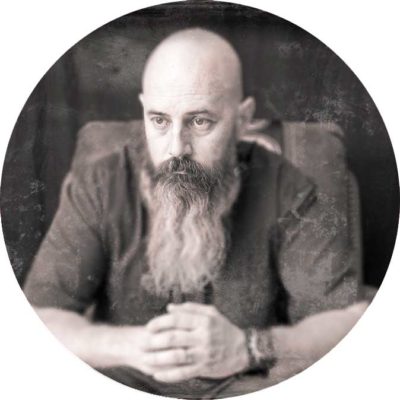 Aaron Chapman is a veteran in the finance industry beginning 1997, exited Mining, Heavy Equipment Operation, Welding and long haul truck driving. Since entering the finance industry his clientele has ranged from those purchasing their first home, building their dream home or investing in multiple properties for long term cash flow. His expertise is in the complicated. Presently ranked #14 in an industry of over 300,000 licensed loan originators for transactions closed annually (723 closed units for real estate investors in 2019, 707 in 2018 and 676 in 2017); Aaron is that battle-worn partner every real estate entrepreneur needs to walk thru the tough parts of building a real estate business.
Aaron Chapman is a veteran in the finance industry beginning 1997, exited Mining, Heavy Equipment Operation, Welding and long haul truck driving. Since entering the finance industry his clientele has ranged from those purchasing their first home, building their dream home or investing in multiple properties for long term cash flow. His expertise is in the complicated. Presently ranked #14 in an industry of over 300,000 licensed loan originators for transactions closed annually (723 closed units for real estate investors in 2019, 707 in 2018 and 676 in 2017); Aaron is that battle-worn partner every real estate entrepreneur needs to walk thru the tough parts of building a real estate business.Love the show? Subscribe, rate, review, and share!

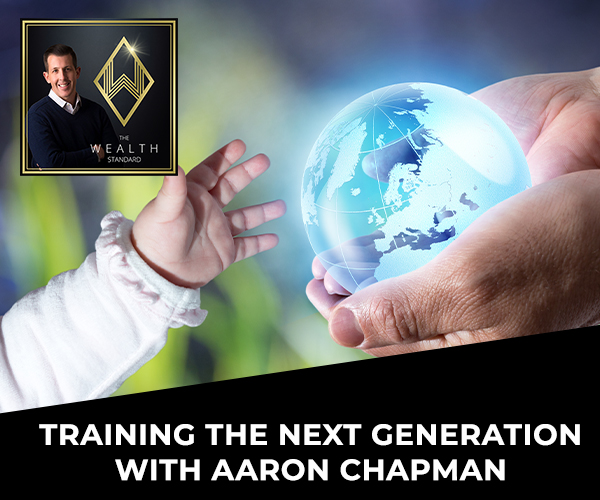
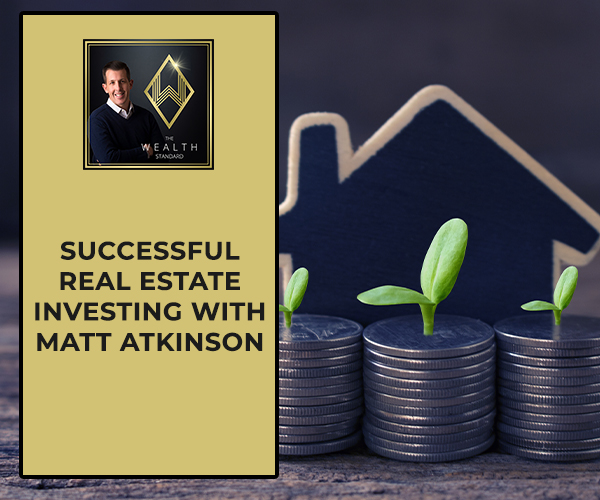
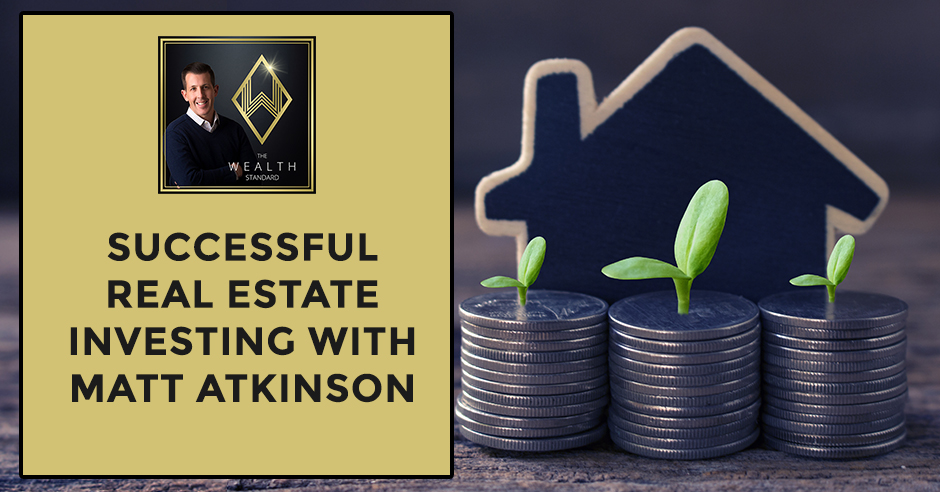



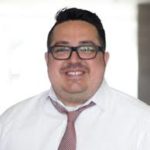 Matt Atkinson started his career in real estate 18 years ago as a mortgage professional and has been investing for the last 15 years. He purchased his first investment property in 2004, a single-family home through a short sale, which is a rental unit he still owns today. However, he over-improved the property, spent too much money on the renovation, and mismanaged his tenants. Throughout this process he learned the struggle of having a full-time job and being a landlord, and how to effectively utilize other industry professionals to improve his investing.
Matt Atkinson started his career in real estate 18 years ago as a mortgage professional and has been investing for the last 15 years. He purchased his first investment property in 2004, a single-family home through a short sale, which is a rental unit he still owns today. However, he over-improved the property, spent too much money on the renovation, and mismanaged his tenants. Throughout this process he learned the struggle of having a full-time job and being a landlord, and how to effectively utilize other industry professionals to improve his investing.

